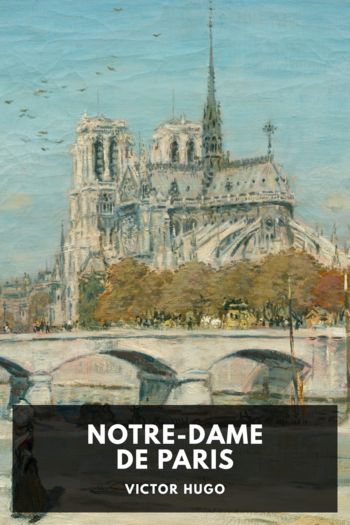Notre-Dame de Paris Victor Hugo (mobile ebook reader .txt) 📖

- Author: Victor Hugo
Book online «Notre-Dame de Paris Victor Hugo (mobile ebook reader .txt) 📖». Author Victor Hugo
“On my soul!” exclaimed Gringoire suddenly, “we are as cheerful and joyous as young owls! We preserve the silence of Pythagoreans or fishes! Pasque-Dieu! my friends, I should greatly like to have someone speak to me. The human voice is music to the human ear. ’Tis not I who say that, but Didymus of Alexandria, and they are illustrious words. Assuredly, Didymus of Alexandria is no mediocre philosopher.—One word, my lovely child! say but one word to me, I entreat you. By the way, you had a droll and peculiar little pout; do you still make it? Do you know, my dear, that parliament hath full jurisdiction over all places of asylum, and that you were running a great risk in your little chamber at Notre-Dame? Alas! the little bird trochylus maketh its nest in the jaws of the crocodile.—Master, here is the moon reappearing. If only they do not perceive us. We are doing a laudable thing in saving mademoiselle, and yet we should be hung by order of the king if we were caught. Alas! human actions are taken by two handles. That is branded with disgrace in one which is crowned in another. He admires Cicero who blames Catiline. Is it not so, master? What say you to this philosophy? I possess philosophy by instinct, by nature, ut apes geometriam.—Come! no one answers me. What unpleasant moods you two are in! I must do all the talking alone. That is what we call a monologue in tragedy.—Pasque-Dieu! I must inform you that I have just seen the king, Louis XI, and that I have caught this oath from him—Pasque-Dieu! They are still making a hearty howl in the city.—’Tis a villanous, malicious old king. He is all swathed in furs. He still owes me the money for my epithalamium, and he came within a nick of hanging me this evening, which would have been very inconvenient to me.—He is niggardly towards men of merit. He ought to read the four books of Salvien of Cologne, Adversus Avaritiam. In truth! ’Tis a paltry king in his ways with men of letters, and one who commits very barbarous cruelties. He is a sponge, to soak money raised from the people. His saving is like the spleen which swelleth with the leanness of all the other members. Hence complaints against the hardness of the times become murmurs against the prince. Under this gentle and pious sire, the gallows crack with the hung, the blocks rot with blood, the prisons burst like over full bellies. This king hath one hand which grasps, and one which hangs. He is the procurator of Dame Tax and Monsieur Gibbet. The great are despoiled of their dignities, and the little incessantly overwhelmed with fresh oppressions. He is an exorbitant prince. I love not this monarch. And you, master?”
The man in black let the garrulous poet chatter on. He continued to struggle against the violent and narrow current, which separates the prow of the City and the stem of the island of Notre-Dame, which we call today the Isle St. Louis.
“By the way, master!” continued Gringoire suddenly. “At the moment when we arrived on the Parvis, through the enraged outcasts, did your reverence observe that poor little devil whose skull your deaf man was just cracking on the railing of the gallery of the kings? I am near sighted and I could not recognize him. Do you know who he could be?”
The stranger answered not a word. But he suddenly ceased rowing, his arms fell as though broken, his head sank on his breast, and la Esmeralda heard him sigh convulsively. She shuddered. She had heard such sighs before.
The boat, abandoned to itself, floated for several minutes with the stream. But the man in black finally recovered himself, seized the oars once more and began to row against the current. He doubled the point of the Isle of Notre Dame, and made for the landing-place of the Port au Foin.
“Ah!” said Gringoire, “yonder is the Barbeau mansion.—Stay, master, look: that group of black roofs which make such singular angles yonder, above that heap of black, fibrous grimy, dirty clouds, where the moon is completely crushed and spread out like the yolk of an egg whose shell is broken.—’Tis a fine mansion. There is a chapel crowned with a small vault full of very well carved enrichments. Above, you can see the bell tower, very delicately pierced. There is also a pleasant garden, which consists of a pond, an aviary, an echo, a mall, a labyrinth, a house for wild beasts, and a quantity of leafy alleys very agreeable to Venus. There is also a rascal of a tree which is called ‘the lewd,’ because it favored the pleasures of a famous princess and a constable of France, who was a gallant and a wit.—Alas! we poor philosophers are to a constable as a plot of cabbages or a radish bed to the garden of the Louvre. What matters it, after all? human life, for the great as well as for us, is a mixture of good and evil. Pain is always by the side of joy, the spondee by the dactyl.—Master, I must relate to you the





Comments (0)